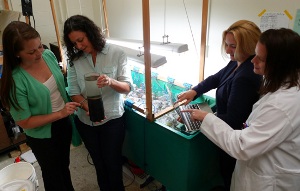Aug 18 2014
Rochester Institute of Technology’s Golisano Institute for Sustainability (GIS) and Thomas H. Gosnell School of Life Sciences are the recipients of a new research grant from the National Science Foundation (NSF) to study the lifecycle environmental impacts of fullerene-based materials—a form of engineered nanomaterials used in solar cells, drug delivery systems and cosmetics.
 Researchers (left to right) Callie Babbitt, Christy Tyler, Gabrielle Gaustad and Sandi Connelly set up an experiment to test the ecological impact of fullerene exposure on samples of sediment from a Finger Lakes ecosystem.
Researchers (left to right) Callie Babbitt, Christy Tyler, Gabrielle Gaustad and Sandi Connelly set up an experiment to test the ecological impact of fullerene exposure on samples of sediment from a Finger Lakes ecosystem.
Callie Babbitt, assistant professor at GIS, is serving as principal investigator for the $300,854 research grant. Gabrielle Gaustad, also a GIS assistant professor, and Christy Tyler, associate professor at the Gosnell School, will assist Babbitt in the research along with Gosnell Assistant Professor Sandi Connelly.
While nanomaterials enable new technologies that benefit society, including applications in medicine, water treatment and renewable energy, “their potential for release into the natural environment and ultimate impact on ecosystem health is poorly understood,” according to Babbitt.
“Through this research, we hope to quantify the risks of these emerging materials—both when they are released into an ecosystem as well as when they are produced, which often has its own toxicity risks due to high electricity and chemical consumption,” Babbitt said.
The research project, which began earlier this month and is scheduled to be completed by the summer of 2017, will analyze the potential toxicity of fullerenes on aquatic organisms and then model the broader impact of nanomaterials exposure on a freshwater ecosystem. In addition, RIT researchers plan to analyze variability in the ecological impact between alternate fullerene production methods; uses in both solar cells and products such as face creams/cosmetics; and disposal pathways such as landfills or recycling.
According to Babbitt, research findings will also be integrated into educational modules developed for classroom and summer enrichment programs aimed at engaging K-12 students—primarily from underrepresented groups—in sustainability research and inspiring them to pursue careers in sustainability as well as other science, technology, engineering and mathematics fields.
NSF is an independent federal agency that supports fundamental research and education across all fields of science and engineering. The foundation’s funding reaches all 50 states through grants to nearly 2,000 colleges, universities and other institutions. Each year, NSF receives about 50,000 competitive requests for funding, and makes about 11,500 new funding awards. NSF also awards about $593 million in professional and service contracts yearly.